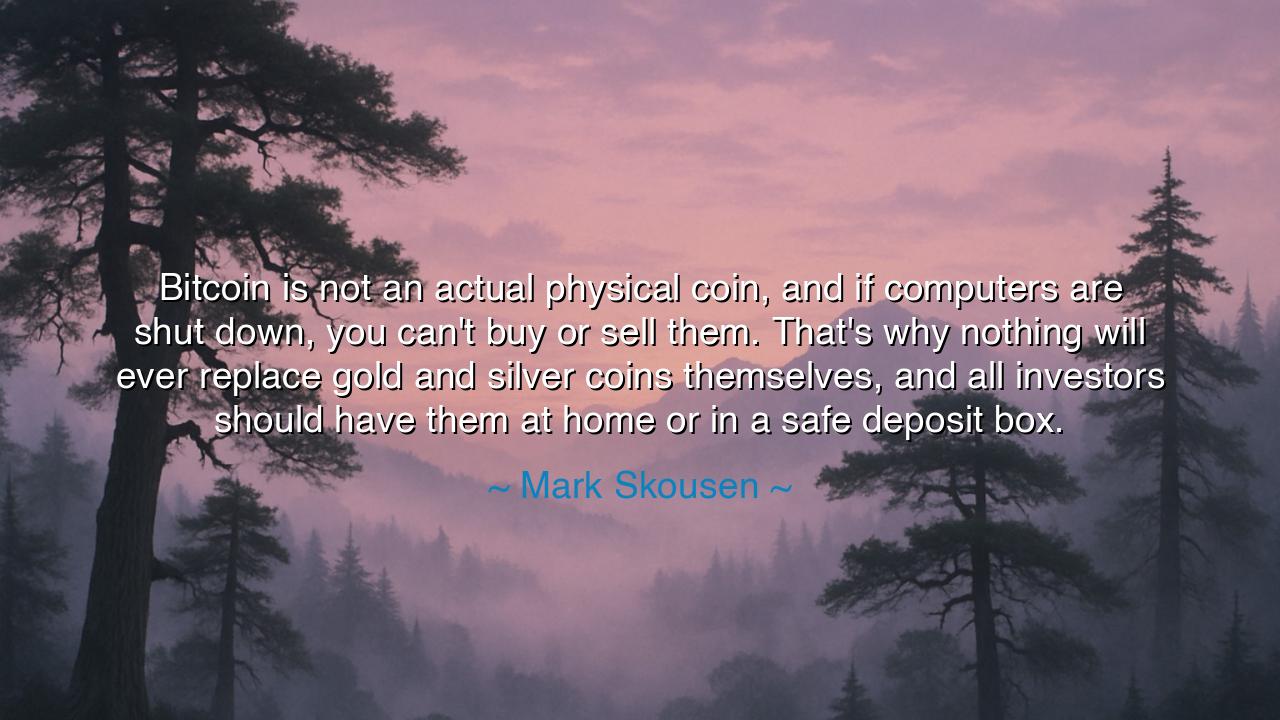
Bitcoin is not an actual physical coin, and if computers are shut
Bitcoin is not an actual physical coin, and if computers are shut down, you can't buy or sell them. That's why nothing will ever replace gold and silver coins themselves, and all investors should have them at home or in a safe deposit box.






Hear now the wisdom of Mark Skousen, who, with clarity and foresight, speaks of a modern creation that has stirred the hearts and minds of many—the Bitcoin, a thing of digital nature, elusive and ethereal. "Bitcoin is not an actual physical coin," he reminds us. In the world where the tangible and the intangible dance a delicate dance, Skousen seeks to ground us in the ancient reality of true wealth—gold and silver. These, he says, endure, for they are of the earth, forged in fire and tempered by time, and no technology, no invention, can ever replace the enduring strength they carry.
Listen closely, for there is deep wisdom in this observation. The great empires of the past, from the pharaohs of Egypt to the emperors of Rome, built their fortunes and their civilizations upon the timeless value of precious metals. Gold and silver were not just currencies; they were symbols of human aspiration, of wealth, power, and security. They have withstood the ravages of time and war, and they hold their value not because of their appearance, but because of the faith humanity has placed in them across millennia. A gold coin is weighty in the hand, its shine lasting beyond a lifetime, its value enduring when all else is lost.
Yet in the modern age, we have created the Bitcoin, a digital currency that exists only in the ether. It is born from the minds of men, and though it may flourish in the world of the internet, it is but a shadow compared to the solid nature of gold. Bitcoin, though valuable in its own right, is bound by the very fabric of technology—it is tied to the internet, to the power of computers, and without these, it ceases to be. It can be hacked, it can be lost in a system crash, and if the networks are gone, so too is the wealth that was once believed to be secure.
Consider the rise and fall of great cities like Babylon, whose wealth was immense but whose foundations were built on the unstable sands of conquest and fortune. There, great treasures glittered in palaces, but those treasures were not everlasting. The city fell to ruin, and with it, so too did the fortunes it held. The lesson is clear: wealth based on the vaporous—whether in the form of paper, digits, or fleeting digital assets—may rise like the morning sun, but without the substance of time-tested value, it will fade when the winds of change blow harshly. Gold, on the other hand, is like the mountain: it endures, steadfast and unyielding, even when the storm rages.
The wisdom of the ancients speaks to us through the ages. Aesop's fables tell of the ant and the grasshopper, of hard work and prudence versus the folly of living without regard for the future. The ant, working diligently and storing his wealth for the winter, represents the wisdom of the ages—securing wealth in something solid, something that will not vanish in times of difficulty. Gold, in this sense, is the ant's store, something that will carry its value through storms, famine, and war.
Skousen's words invite us to reflect on this truth: We must secure our wealth not in the fleeting promise of the future, but in the tangible and the eternal. Gold and silver stand as timeless markers of security, and no matter the digital revolution that may sweep the world, the value of these metals will never fade. They remain the true wealth of kings and commoners alike. They are the mirror to our human history, our desires, and our unspoken trust in what is real and lasting.
And so, what lesson can we take away from this, O Seekers of wisdom? Do not place all your trust in things that can vanish, be they wealth on a screen or fleeting fortunes built on promises of the future. Instead, ground yourself in what is certain. Secure your wealth in gold, in silver, in things that endure. Let technology be your servant, not your master, for though it may open many doors, it can also shut them as quickly as it opened them. In all things, balance is the key—embrace the advancements of the digital age, but remember the ancient truths that have guided us through the centuries. Only then will your house be built on rock, and not upon shifting sands.






AAdministratorAdministrator
Welcome, honored guests. Please leave a comment, we will respond soon